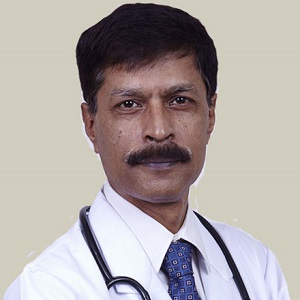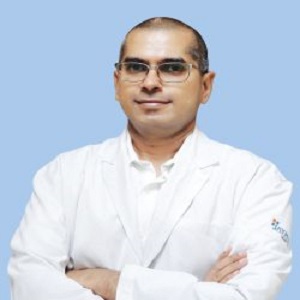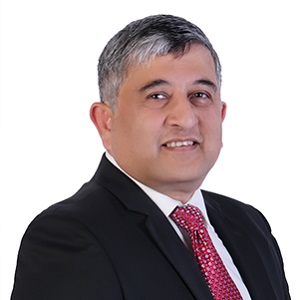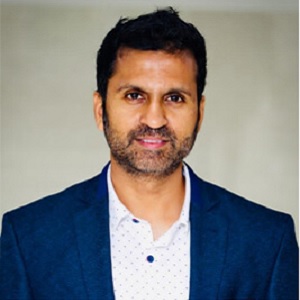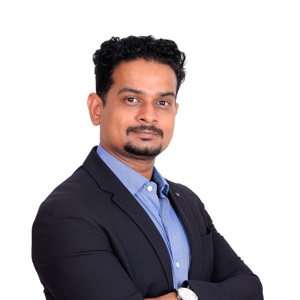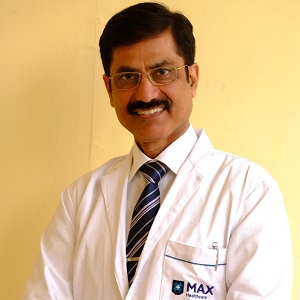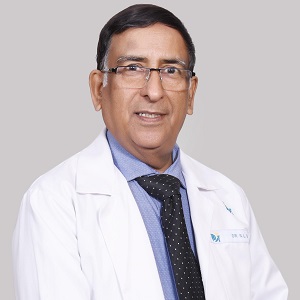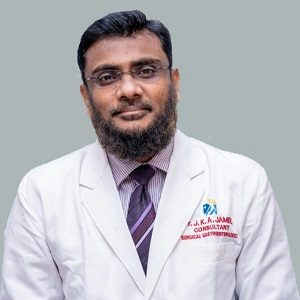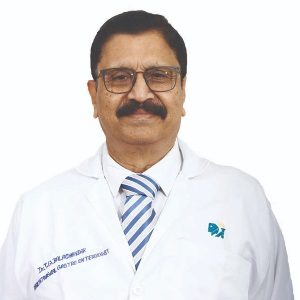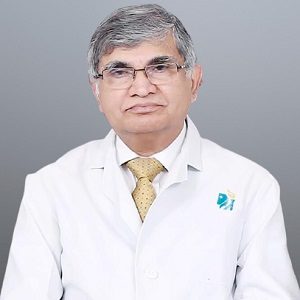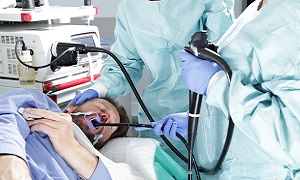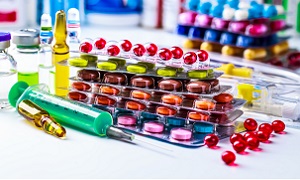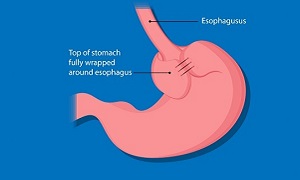Best Doctors in India for GERD Treatment
- Liver Transplant Surgeon and HPB Surgeon, New Delhi, India
- Over 20 years’ experience
Profile Highlights:
- With over 20 years of experience in performing complex operations for cancer, and other diseases involving the pancreas, liver, and gall bladder, Dr. Anupam Saha has been the foremost gastro intestinal and Hepato-Pancreato-biliary surgeon of the Indian Armed Forces.
- He did a 1-year fellowship in Liver Transplantation as well, at King’s College Hospital, London.
- For his service, Dr. Anupam Saha has also been awarded the Vishist Sewa Medal by the Armed Forces.
- Liver Transplant Surgeon & HPB Surgeon, Noida, India
- Over 17 years’ experience
Profile Highlights:
- Dr. K R Vasudevan is a surgical gastroenterologist who has been trained at one of India’s best hospitals. Over a short span of 17 years, his career has progressed to the role of leading a team.
- He has established and sustained a liver transplant program at PSRI over the last few years. Due to his experience with over 1200 live donor liver transplants, he was selected for this role.
- HBP & Liver Transplant Surgeon, Bengaluru, India
- Over 35 years’ experience
Profile Highlights:
- Dr. Sanjay Govil is an accomplished HBP & Transplant Surgeon. He completed FRCS from the Royal College of Surgeons in England.
- He has achieved a few major accomplishments throughout his life as well, which include the First Liver Resection in Karnataka, in 2007, First Laparoscopic Liver Resection in a Cirrhotic Liver in Karnataka in the year 2008, First Laparoscopic Pancreatic duodenectomy in Karnataka in 2008, First ALPPS procedure in India in 2012 and several more.
- He trained in liver surgery and transplantation at Kings College Hospital in London, Queen Mary’s Hospital in Hong Kong, and the Graduate School of Medicine in Tokyo.
- Hepatologist & Gastroenterologist, Chennai, India
- Over 18 years’ experience
Profile Highlights:
- Dinesh Jothimani is a Hepatologist and Gastroenterologist with over 18 years of experience.
- He completed his MRCP (UK) from the Royal College of Physicians, London in 2004.
- Dr. Dinesh Jothimani is a liver specialist trained in the UK and Australia. He cares for his patients who suffer from liver diseases and performs skillful liver transplants.
- Senior Consultant - Hepatology and Liver Transplant, Mumbai, India
- Over 13 years’ experience
Profile Highlights:
- Dr. Uday Sanglodkar is a highly motivated and compassionate medical gastroenterologist with experience in hepatology/transplant hepatology.
- Dr. Uday Sanglodkar has vast experience in pre and post-liver transplant care, liver intensive care management, and evidence-based management of gastrointestinal and liver diseases.
- Dr. Sanglodkar is also an expert at diagnostic and therapeutic gastrointestinal endoscopy.
- Liver Transplant Surgeon, New Delhi, India
- Over 30 years’ experience
Profile Highlights:
- Dr. Sanjiv Saigal is a trained Hepatologist who has spearheaded the medical team of liver transplantation in the largest liver transplant program in India for over a decade
- Dr. Saigal is a bright name in the field of Gastroenterology and a famous liver transplant specialist with over 3400 successful Liver Transplants in his career.
- Medical Gastroenterologist, New Delhi, India
- Over 54 years’ experience
Profile Highlights:
- Dr. Sohan Lal Broor is a Gastroenterologist and has an experience of 54 years in this field. Dr. Broor practices at Indraprastha Apollo Hospitals in New Delhi.
- He completed MBBS from Panjab University in 1967, MD – Medicine from PGIMER, Chandigarh in 1972, and DM – Gastroenterology from PGIMER, Chandigarh in 1974.
- Dr. Sohan Lal Broor is a member of the 2-Year Fellowship in Gastroenterology at Medical College Of Wisconsin, Milwaukee, USA.
- Some of the services provided by Dr. Broor are Irritable Bowel Syndrome ( IBS ) Treatment, Peptic/ Gastric Ulcer Treatment, Inflammatory Bowel Disease (IBD) Treatment, Hemorrhoids Treatment, and Gastritis Treatment.
- Surgical Gastroenterologist, Chennai, India
- Over 22 years’ experience
Profile Highlights:
- Dr. Jameel is an internationally acclaimed GI and Minimal Access Surgeon from India with more than 22 years of experience.
- He underwent higher surgical training and Oncology research in Yorkshire. Dr. Jameel also did Robotic Surgical training at the University College Hospitals, London.
- Following his successful completion of training and obtaining CCT, he practiced at MidYorkshire Hospitals. In addition to consultation, he was an educational supervisor and provided surgical training to many surgeons.
- Surgical Gastroenterologist, Chennai, India
- Over 41 years’ experience
Profile Highlights:
- Dr. Bala Chandran T G is a veteran gastroenterologist with over 41 years of experience.
- Apart from completing his MBBS, MS, and MCh, he has done a fellowship from the Royal College of Surgeons of Edinburgh, the UK.
- He obtained training in laparoscopic techniques from Ethicon Endosurgery Institute, Mumbai.
- Dr. Bala Chandran T G has done much research, authored, and published several articles in many publications.
- Surgical Gastroenterologist, Chennai, India
- Over 48 years’ experience
Profile Highlights:
- Dr. Prasanna Kumar Reddy is a veteran gastroenterologist in Chennai.
- Along with MBBS and DNB in surgery, he has a Diploma in Laparoscopy from Strasbourg.
- Over the years, Dr. Prasanna Kumar Reddy has gained enough recognition and appraisals for his treatment methods and has become one of the most preferred doctors.
Best Hospitals in India for GERD Treatment
Wockhardt Hospitals, Mumbai
- City: Mumbai, India
Hospital Highlights:
- Wockhardt Hospitals were established in the year 1973, originally called First Hospitals and Heart Institute.
- Wockhardt Hospitals are super specialty health care networks in India, nurtured by Wockhardt Ltd, India’s 5th largest Pharmaceutical and Healthcare company.
- Wockhardt Hospitals is associated with Partners Harvard Medical International, an international arm of Harvard Medical School, USA.
- Wockhardt Heart Hospital performed India’s first endoscopic heart surgery.
- The hospital has a state-of-the-art infrastructure equipped with the latest technologies and modern equipment.
- It has special Centers of Excellence dedicated to the major specialties to provide hassle-free and high-quality clinical care.
Pushpawati Singhania Hospital & Research Institute, New Delhi
- City: New Delhi, India
Hospital Highlights:
- Established in 1996, Pushpawati Singhania Research Institute is one of the top hospitals in the NCR region, as well as one of the top facilities in India for gastroenterology. The hospital is one of South Asia’s first institutes in medical and surgical treatment for diseases related to digestion.
- The hospital is equipped with state-of-the art facilities coupled with the latest equipment as well as renowned consultants from various parts of India as well as other parts of the world.
W Pratiksha Hospital, Gurgaon
- City: Gurugram, India
Hospital Highlights:
- W Pratiksha Hospital, Gurugram, is one of the best hospitals in the NCR region. It is also a top hospital in India for IVF. Since its inception, the hospital has performed over 5500 successful IVFs. The hospital also specializes in gynecology.
- With over 20 years of experience in providing quality healthcare, the hospital is known as one of the most trusted and valued health providers in India.
- Equipped with world-class medical facilities and advanced technology, the hospital’s doctors and clinicians also have a track record of delivering excellent results. The hospital is also known for focusing on preventive well-being as much as on curative treatment.
- The hospital has earned the trust of its patients, by providing the best available treatments at affordable costs.
Narayana Superspeciality Hospital, Gurugram
- City: Gurugram, India
Hospital Highlights:
- Situated near DLF Cyber City, Gurugram, Narayana Superspecialty Hospital is one of the top medical facilities in the Delhi NCR region, catering to the needs of the people. Known for its commitment to quality medical care and patient service, the hospital is a state-of-the-art facility with planned and well-equipped sections, which includes a spacious OPD area as well as comfortable patient rooms.
- It is the closest super-specialty hospital from Indira Gandhi International Airport towards Gurugram, and also the nearest super specialty hospital from DLF Cyber City. It is also close to major residential areas in Gurugram.
- It is part of the renowned Narayana Health Group. Established in 2000, by Dr. Devi Shetty, a renowned cardiac surgeon, it has grown to be one fo India’s leading healthcare groups.
Sir Ganga Ram Hospital, New Delhi
- City: New Delhi, India
Hospital Highlights:
- Sir Ganga Ram Hospital, New Delhi is known to provide the latest medical procedures with the latest technology in all of its units.
- The hospital has a team of reputed doctors, nurses, and healthcare professionals that ensure that patients receive quality care at affordable costs.
- Staffed with a team of highly qualified doctors, dedicated nurses, and paramedical and non-medical staff, the hospital aims to lead in healthcare delivery, medical education, training, and research.
- As per the vision of the founder, the hospital also provides free treatment to the economically weaker sections of society.
- Sir Ganga Ram Hospital also provides training to young doctors under the Diplomate in National Board(DNB) program. The DNB program at the hospital was started in 1984 and it is known for currently running the maximum number of DNB specialties in the country. It also has the distinction of having the first bone bank in India.
CK Birla Hospital, Gurugram
- City: Gurugram, India
Hospital Highlights:
- The CK Birla Hospital in Gurugram is a NABH-accredited multi-specialty hospital.
- The hospital strives to increase the quality of healthcare by focusing on UK NHS nurse and midwife training requirements. Policies and practices derived from the National Institute for Health and Treatment Excellence (NICE) recommendations in the United Kingdom ensuring that a strong focus on safety, high-quality clinical care, and sanitation is maintained.
- The hospital’s cutting-edge technology and facilities allow for real-time communication and seamless collaboration among caregivers, ensuring accuracy and the best possible results. Those with foreign experience and accreditations make up part of the hospital’s team of clinicians.
KIMS Hospital, Hyderabad
- City: Hyderabad, India
Hospital Highlights:
- KIMS Hospital (a brand name of Krishna Institute of Medical Sciences) is one of the largest and best multi-speciality hospitals in Hyderabad. The hospital provides various treatments to an enormous number of patients.
- The hospital has a capacity of more than 3000 beds. KIMS Hospitals offers different healthcare services in more than 25 specialities and super specialities.
- The hospital is equipped with modern medical equipment and technology. It has robotic equipment to provide minimal invasive techniques for patients.
- The hospital is aimed at providing world-class healthcare facilities and services at an affordable cost for patients.
- The various specialities and departments of the hospital include neurosciences, gastroenterology & hepatology, robotic science, reproductive sciences, dental science, oncological sciences, organ transplantation, heart and lung transplantation and mother and child care.
Fortis Hospital, Shalimar Bagh
- City: New Delhi, India
Hospital Highlights:
- Fortis Hospital in Shalimar Bagh is a multi-super specialty hospital that strives to provide world-class patient care by leaving no stone unturned.
- Fortis, Shalimar Bagh, with 262 beds and a 7.34-acre footprint, provides the best level of medical care through its team of doctors, nurses, technicians, and management professionals.
Reliance Hospital, Mumbai
- City: Mumbai, India
Hospital Highlights:
- Reliance Hospital is one of the best super-specialty care hospitals in Navi Mumbai.
- The main purpose of this hospital is to become a trustworthy place for the best health and hope for society. The hospital is well connected to the suburbs of Mumbai and Navi Mumbai.
- The hospital has various specialty departments, viz., Accident & Emergency, Anesthesiology, Dental Services, Dermatology, Diabetology, Dietetics Nutrition, Endocrinology, ENT, Gastroenterology, General Surgery, Gynaecology And Obstetrics, Hepato Pancreato Biliary Surgery, Infectious Disease, Internal Medicine, Interventional Radiology, Laboratory Medicine, Minimal Access Laparoscopic Surgery, Nephrology, Neurosciences, Opthalmology, Orthopaedics, Paediatrics, Pain Management Palliative Care, Physical Medicine Rehabilitation, Plastic And Reconstructive Surgery, Psychiatry, Pulmonary Medicine, Radiology, Rheumatology, Transplant, Urology Andrology, Vascular Surgery
Lilavati Hospital & Research Centre, Mumbai
- City: Mumbai, India
Hospital Highlights:
- Lilavati Hospital & Research Centre is India’s premier multi-speciality tertiary care hospital and has been recognised as a global medical excellence centre.
- Lilavati Hospital & Research Centre has built an unrivalled level of trust with its patients over the years, thanks to a solid foundation that comprises cutting-edge facilities, the best medical competence, research, education, and charity endeavours.
- The hospital is quite proud of the fact that it now serves patients from all kinds of backgrounds, not just from the United States but from all around the world.
- The hospital has a total of 323 beds, one of the largest Intensive Care Units (ICUs), 12 Operation Theatres with modern amenities, over 300 consultants, and almost 1,800 personnel.
GERD
Gastroesophageal Reflux Disease also known as GERD, is a digestive disorder which is known to affect the lower esophageal sphincter, the ring of muscle between the esophagus and the stomach. It occurs when the stomach acid frequently flows back into the tube which connects the mouth and the stomach. The backwash might irritate the lining of the esophagus. Many people are known to experience this ailment quite often.
How severe this ailment is, depends on LES dysfunction as well as the type and amount of fluid which is brought up from the stomach and the neutralizing effect of saliva also.
Causes of GERD
Occasional acid reflux which is known to be quite common, often occurs as a result of overeating, lying down after eating or consuming some kinds of particular foods. However, GERD is recurrent acid reflux and can occur in people of all ages and it usually has other causes as well as risk factors. It can also cause even more serious complications.
GERD starts to occur when the sphincter located at the bottom of the esophagus becomes weak or it opens when it is not supposed to. GERD is more commonly seen among people who are:
- Obese or overweight due to increased pressure on their abdomen
- Pregnant, due to the same increased pressure
- Taking certain medications; this may include medications for asthma, sedatives, antidepressants, etc.
- Smoking or being exposed to second-hand smoke
Symptoms of GERD
GERD has multiple signs and symptoms, which include:
- A burning sensation in the chest usually after eating, which can get worse at night
- Pain in the chest
- Difficulty in swallowing
- Regurgitation of food or sour liquid
- Sensing a lump in the throat
If you are having nighttime acid reflux, then you may also experience disrupted sleep, chronic cough, laryngitis or asthma.
Diagnosis of GERD
Your doctor will be able to diagnose GERD using physical examination and history of your signs and symptoms. To confirm a diagnosis of GERD or to check for complications, your doctor may recommend:
Upper endoscopy
During upper endoscopy, your doctor will be inserting a thin, flexible tube that is equipped with a light as well as a camera. It is sent down your throat in order to examine the insides of your esophagus and stomach. When reflux is present, test results are often normal, but an endoscopy can detect inflammation of the esophagus or any other such complications. An endoscopy has other uses as well, such as collecting a tissue sample to be tested for complications such as Barrett’s esophagus.
Ambulatory acid probe test
During ambulatory acid probe test, a monitor is placed in your esophagus in order to identify when and for how long stomach acid regurgitates there. The mentor is connected to a small computer that you can strap over your shoulder or even wear around your waist.
Esophageal manometry
Esophageal manometry test is meant to measure the rhythmic muscle contractions in the esophagus when you swallow. Esophageal manometry can also be used to measure the coordination and the force exerted by the esophagus muscles.
X-ray of your upper digestive system
X-rays are taken after one drinks a chalky liquid which coats and fills the inside lining of one’s digestive tract. This coating will allow your doctor to see a silhouette of your stomach, esophagus, as well as your upper intestine. You might also be asked to swallow a barium pill which can help you in diagnosing a narrowing of the esophagus that might interfere with swallowing.
Treatment options for GERD
It is likely that your doctor will recommend that you first try lifestyle modifications and over-the-counter medications. If you are not experiencing relief within a few weeks, you might be recommended prescription medication or surgery.
Prescription medication
There are several options-
Antacids to neutralize stomach acid: Antacids, such as Mylanta or Rolaids can help you by providing quick relief. However, antacids alone will not heal an inflamed esophagus which has been damaged by stomach acid. Overuse of some antacids might cause side effects like diarrhea or even kidney problems.
Medications for reducing acid production: These kinds of medications which are known as H-2 receptor blockers include cimetidine, famotidine as well as nizatidine. However, H-2 receptor blockers don’t act as quickly as antacids. However, they are able to provide longer relief and might decrease acid production from the stomach up to 12 hours. Stronger versions are also available which you can obtain through prescription.
Medications for blocking acid production and healing esophagus: Also known as proton pump inhibitors, are stronger kind of acid blockers than H-2 receptor blockers and also allow time for damaged esophageal tissue to heal. Over-the-counter proton pump inhibitors can include lansoprazole and omeprazole.
Prescription-strength treatments for GERD include-
- Prescription-strength H-2-receptor blockers: This includes prescription-strength famotidine and nizatidine. Though these medications are usually well-tolerated, long-term use can lead to a slight increase in deficiency of vitamin B-12.
- Medication for strengthening the lower esophageal: Baclofen might help in easing GERD by decreasing the frequency of relaxations of the lower esophageal sphincter. However, there might be side effects which can include nausea or fatigue.
- Prescription-strength proton pump inhibitors: These include esomeprazole, lansoprazole, omeprazole, pantoprazole, dexlansoprazole and rabeprazole. It is generally well-tolerated but these medications might lead to diarrhea, nausea, headache as well as deficiency of vitamin B-12. Chronic use can also lead to hip fracture.
Surgery and Other Options
Though GERD can be controlled using medications, people can opt for surgery, if medications don’t help or if one wishes to avoid long-term use of medications. Your doctor will recommend:
Fundoplication
In Fundoplication, the surgeon will wrap the top of the stomach around the lower esophageal sphincter, in order to tighten the muscle as well as prevent reflux. Fundoplication is done usually with a minimally invasive procedure. The wrapping of the top part of the stomach may be partial or complete.
LINX Device
This procedure involves a ring of tiny magnetic beads which is wrapped around the junction of the esophagus and the stomach. The magnetic attraction between the beads is strong enough to keep the junction to refluxing acid, but at the same time, weak enough to allow the food to pass through. Through minimally invasive surgery, the LINX device can be implanted quite easily.
Transoral incisionless fundoplication
Transoral incisionless fundoplication is a new form of procedure, which involves tightening the lower esophageal sphincter by creating a partial wrap around the lower esophagus with the help of polypropylene fasteners. This procedure is performed through the mouth with a device which is called an endoscope and it doesn’t require any surgical incision. Its advantage is that the recovery time is quick and the tolerance is high. If you are having a large hiatal hernia, this procedure can’t be performed alone. However, it might be possible if this procedure is combined with laparoscopic hiatal hernia repair.
Risk Factors
There are certain conditions that can increase your risk of having GERD. They include:
- Obesity
- Pregnancy
- Connective tissue disorders
- Delayed stomach emptying
- Bulging at the top of the stomach
There are several factors which can aggravate acid reflux and these include:
- Smoking
- Consuming large meals, especially late at night
- Drinking certain beverages, like alcohol or coffee
- Take medications like aspirin
Complications of GERD
If it is left untreated, GERD can worsen into other conditions, such as-
- Esophagitis: This is a form of inflammation of the esophagus.
- Esophageal stricture: In this condition, the esophagus is seen to become narrow, which makes it difficult to eat and swallow
- Barrett’s esophagus: In this condition, the esophagus can change into cells that are similar to the lining of the intestine. This might eventually develop into cancer.
- Respiratory problems: One might sometimes breathe stomach acid into the lungs and this can cause a range of problems, which can include chest congestion, hoarseness, laryngitis, asthma or pneumonia.

